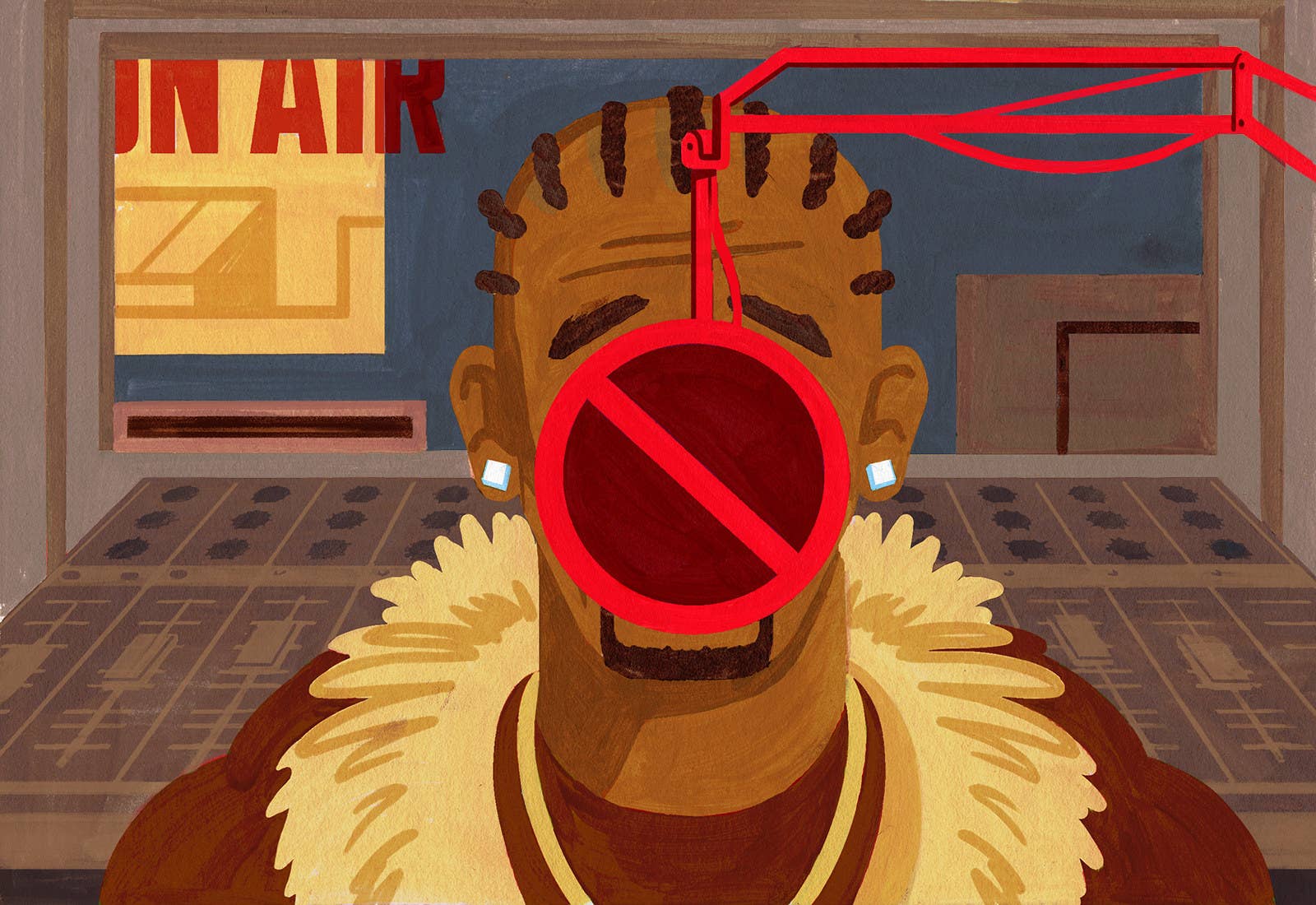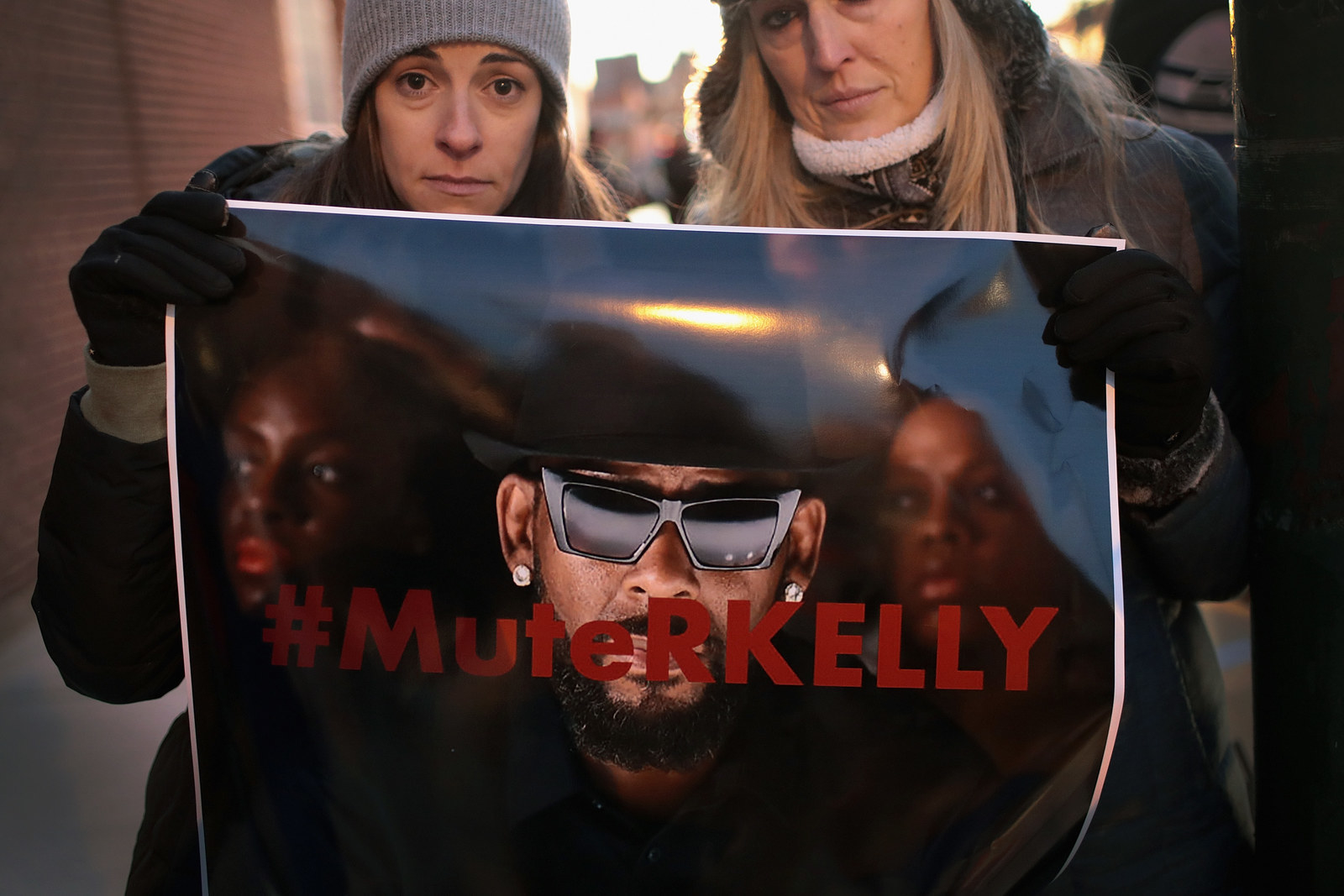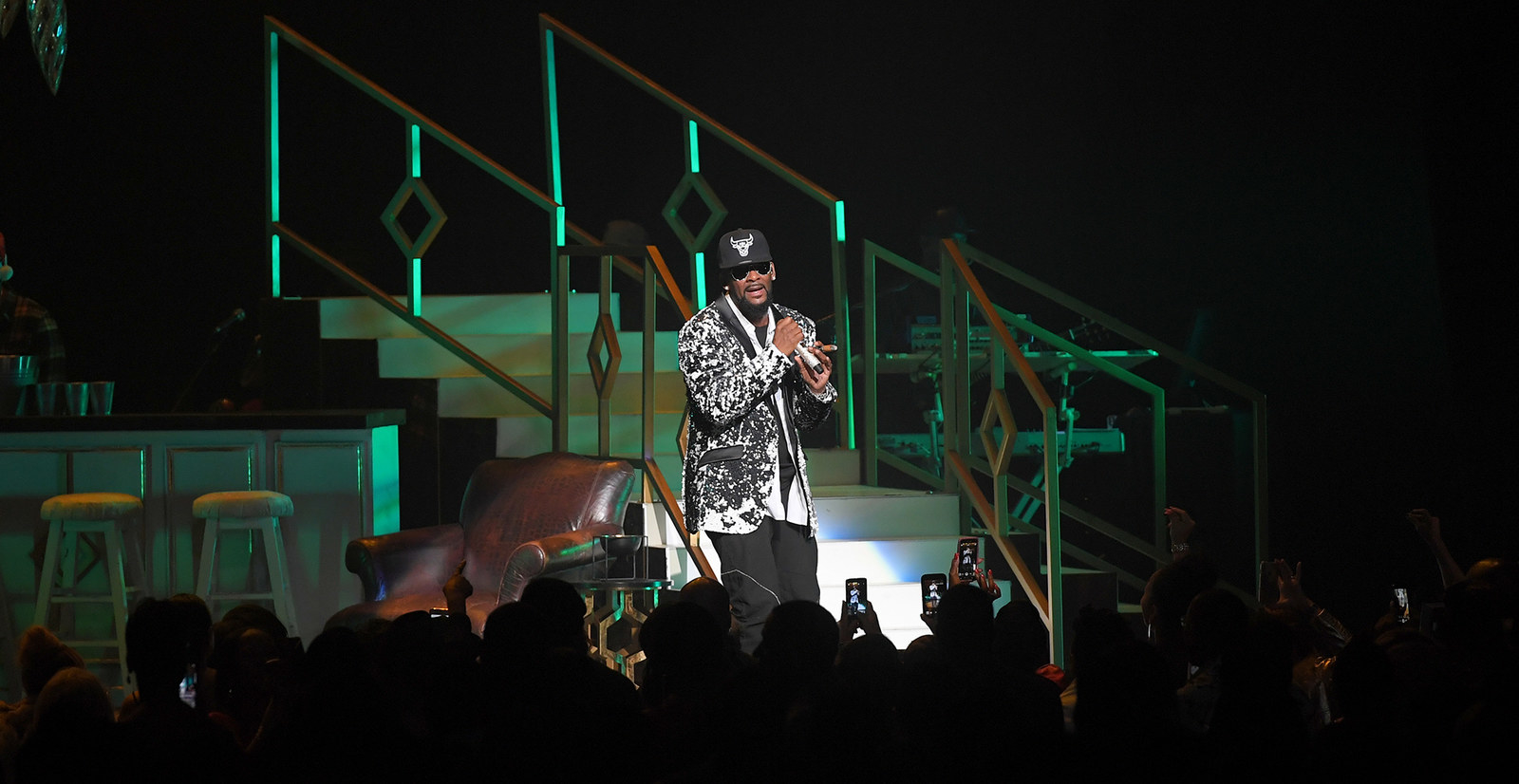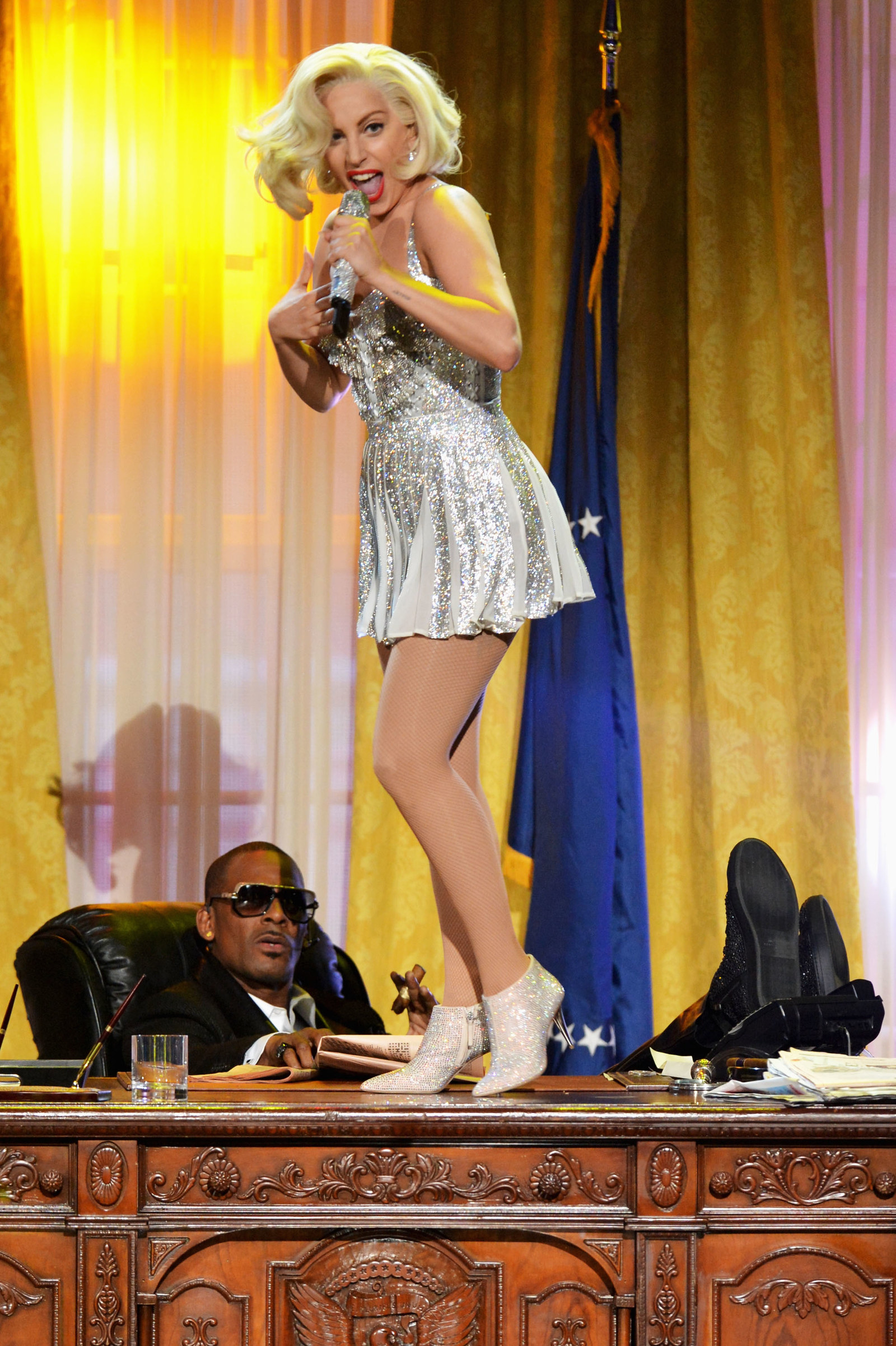
After watching Lifetime’s Surviving R. Kelly documentary, Jerold Jackson, a radio program director in Lafayette, Louisiana, was angry.
“To see the faces of those people, to hear that every single person was saying the same exact thing ... it was describing an MO of how he operates,” Jackson told BuzzFeed News. “That’s pimp-like quality and that’s the last thing we need.”
Jackson suddenly felt compelled to pull down a plaque on his wall that he said he’d received from R. Kelly himself at a National Black Programmers Coalition years before, “thanking” him for playing the singer’s music. Jackson’s radio stations, KRRQ 95.5 and KNEK 104.3, no longer play the singer’s music.
Jackson’s stations are not alone. After decades of giving the musician airtime, many urban, R&B, and even pop stations across the US now seem to be slowly abandoning Kelly, as they find it increasingly difficult to turn a blind eye to the severity of the claims against him in the #MeToo era. BuzzFeed News spoke with almost a dozen radio workers across the country about how they’re handling the renewed focus on the singer’s scandals, revealing that the coordinated campaign by activists to #MuteRKelly may indeed be breaking through where it counts: the gatekeepers of the music industry.
For Jackson, the choice to no longer play Kelly’s music was one that ultimately came down to question of empathy. “Do we care about women?” he asked. “Do we care about our audience? That’s where I am as a program director.”
Kelly’s alleged predatory sexual behavior began as murmurs in the ‘90s. In 1994, Vibe magazine published a marriage license between him and the singer Aaliyah that listed his age as 27 and hers as 18, though she would’ve actually been 15 at the time, prompting speculation her age was forged. Yet Kelly’s star continued to burn brightly, even as he was indicted, and eventually acquitted in 2008, on 14 counts of making child pornography.
Then in 2017, just months before the Harvey Weinstein stories ushered in the #MeToo era, BuzzFeed News reported that parents had told police that Kelly was holding their adult daughters against their will in what was described as a “sex cult.” The singer was allegedly controlling all aspects of the women’s lives, as well as filming sexual encounters with them. Kelly has repeatedly and vehemently denied all the accusations against him.
“I haven’t played R. Kelly since 2017, when I first started hearing about the sex cult allegations,” New York–based DJ Olivia Dope told BuzzFeed News. “Wish it were sooner than that, but yeah, that’s when I pretty much made a conscious decision to just stop playing his music.”
Skip Dillard, an operations manager at WBLS and WLIB radio in New York City, also said he began slowly taking Kelly’s music out of rotation nearly two years ago when the sex cult allegations first came to light. He stopped playing Kelly’s music entirely early last year after getting complaints from his many black women listeners.
“I talked to my DJs and asked them what they thought about not playing R. Kelly’s music and there was a consensus that we could do without it, and our listeners were becoming vocally opposed to us playing it so we took it out,” Dillard said.
In the wake of the BuzzFeed News report, the #MuteRKelly campaign, founded by Kenyette Barnes and Oronike Odeleye, turbocharged efforts to pressure streaming services, concert venues, and radio stations to blacklist the star’s music. The campaign received further publicity once Time’s Up, an organization that supports victims of sexual assault, published an open letter in April 2018 urging companies linked to the singer to stop supporting him.
Soon after, the veteran radio host Tom Joyner, who boasts the No. 1 syndicated morning show and appears in more than 105 markets, vowed to stop supporting Kelly’s music on his program, after being pressed on air in an interview by #MeToo founder Tarana Burke. Joyner’s decision was seismic given his stature in the black community. In a 2007 New York Times profile on the longtime host, Rev. Jesse Jackson said black radio “was the most central vehicle for communicating with masses of African-Americans,” and added that Joyner’s show, which attracted 8 million listeners a week at the time, was “the preeminent vehicle.”
“You have to feel some type of culpability or feel complicit in some way, especially if you work in radio.”
Now, the #MuteRKelly campaign has only accelerated since the Lifetime documentary — and investigations in Georgia and Illinois that were subsequently reopened — renewed attention on the singer. Since Surviving R. Kelly aired, two prominent Dallas radio stations have stopped playing Kelly’s music, while in Chicago, the singer’s hometown, the station 95.1 banned his music too. “As a leader of a team where women contribute unselfishly, in a business where the majority of our audience is women…” said station CEO Lamont Watts, “we will no longer play the music of R. Kelly.”
Raqiyah Mays, a former WBLS DJ who hosts the podcast Real Black News, said she was angry after watching the documentary, mostly at how she’d supported Kelly in the past, thinking about the times she played his music or given away tickets on air to his concerts.
“There is no way that anyone can watch that show and not feel he’s guilty, “ said Mays, “especially if you’re in the entertainment industry — you have to feel some type of culpability or feel complicit in some way, especially if you work in radio.”
The evidence isn’t just anecdotal, either. According to a recent Billboard report, the singer’s airplay totaled 1.25 million on Jan. 3, the day Surviving R. Kelly premiered. Over the course of the documentary’s three-night premiere, there was a precipitous decline in Kelly’s music on the radio, going from 800,000 audience impressions on Jan. 5 to 380,000 on Jan. 6. This was on top of a decline of nearly 5 million audience impressions for Kelly in all of 2018.
BuzzFeed News also gathered information on Kelly’s airplay using the tracking service Warm, which monitors 26,000 radio stations in 130 countries. The data showed that in the first two weeks of January, “Ignition (Remix),” perhaps Kelly’s most famous song, was played in the US as many as 35 times a day at the start of the month, but slipped down to less than 10 plays per day after the documentary had aired.

While the Lifetime documentary has energized Kelly’s opponents, many have been wondering what took stations so long to move away from the singer. Urban radio’s reluctance to disavow Kelly may have been based in a fear of seeing “another black man go down on the world stage,” according to Jackson, who is black. “Some people have their lives completely ruined just on the basis of an accusation.”
Jason Goodman of the pop-centric station 107.5 KZL in North Carolina and vice president of Dick Broadcasting, said listeners are also to blame, having been comfortable looking the other way for years about many artists.
“Through time Michael Jackson has been accused of things too and yet we see everybody dancing at weddings or listening to [his music].”
“Through time Michael Jackson has been accused of things too and yet we see everybody dancing at weddings or listening to [his music],” he said. “They kind of put that to the wayside after time. It’s kind of a fine, weird line of how it works.”
But Dillard, the NYC operations manager, said this new movement against Kelly is different due to social media pressure amid the #MeToo movement. “There’s much more of a consciousness and awareness through social media than ever,” he said.
Still, he said, radio stations should not be blamed for not doing more in years past to dig deeper into the allegations. “Remember, it’s a music station,” he said. “We don’t have a journalistic investigative team. We’re not going to go out and say, ‘OK, let’s go see some court records in Chicago.’ That’s not what we do.”
Even now, not all radio stations are on board with the #MuteRKelly movement, as the singer continues to receive airplay and support from some fans.
“As radio stations, we have to be mirror images of our community,” said one program director at a midwestern R&B station, who asked to remain anonymous due to concerns of retaliation from their employer. “As long as his music is testing well, you know, we kind of have to give people what they want.”
Yet this same program director, who works for Cumulus Media, said they would stop playing Kelly’s music were it up to them. “There has to be a moral compass,” they said.
Indeed, Kelly does still have fans, including many women. Some supporters showed up outside his Chicago recording studio earlier this month to counter a demonstration from his detractors. Others chose to exercise their listener autonomy on streaming platforms, where Kelly’s catalog experienced an uptick to 4.3 million streams on Jan. 5, a stark difference from the 1.9 million he had on Jan. 2, the day before Surviving R. Kelly aired.
“As long as his music is testing well, you know, we kind of have to give people what they want.”
Ken Johnson, an executive at Cumulus Media who acts as director of urban formats, said he didn’t believe that by continuing to play Kelly’s songs he was supporting the singer financially.
“One of the issues with that is, you’re going to have to pull out Michael Jackson titles, you’re going to have to pull out Maxwell titles to try and affect him financially,” Johnson said, referencing artists who Kelly has written songs for.
“Our role is not to punish R. Kelly,” he said. “That’s what the Justice Department does.”
Johnson said Cumulus hasn’t issued a statement on Kelly because program directors have the ability to choose whether or not playing any particular singer’s music is suitable for their particular audience, and every market is different.
If a program director determines “playing R. Kelly is not in the best interest of your listeners and your community,” Johnson said, “then that’s what you do.”

While urban radio has been foundational to Kelly’s career, his presence also definitely extends to Top 40 radio, where he’s had hits that appeal to audiences who prefer pop music. Yet there, too, Kelly’s presence may be waning.
“It’s not worth playing that song at this point if people are going to get upset about it or complain,” said Goodman, the North Carolina radio host and programming executive.
Goodman this month removed one of Kelly’s much-loved remixes, “Ignition,” from the airwaves, citing the recent documentary, as well as the official investigation into Kelly’s alleged sexual abuse in Illinois and Georgia.
He estimates that the song played about one time a week prior to its temporary removal due to its status as a “gold song,” which he explained as a tune that’s a bit older but consistently performs well.
“It wasn’t that big of a deal to pull it because they’re so many other gold songs to play, and it just wasn’t worth the risk,” he said.
But what if it was a new Kelly song that people were obsessing over? Would radio stations still be able to stick to its decision and refuse to support his artistic efforts?
“If it was an R. Kelly song that was doing really well and he had a hit right now on Top 40 radio that was on fire then that would be a whole other type of decision we would have to outweigh,” said Goodman, “and we would really have to analyze complaints, as well as the research.”
Radio has previously helped Kelly bolster hits in times of crisis. In 2003, after being arrested on child pornography charges on which he was later acquitted, Kelly released his fifth solo album, Chocolate Factory. The album debuted at No. 1 on the Billboard 200 albums chart and two of its singles, “Ignition” and “Step in the Name of Love,” reached No. 2 and No. 9 on the Hot 100, respectively, during an era when artists depended a lot more on airplay as a means of getting a hit.

For many years, Kelly has continued to work with big-name artists despite the serious claims against him. That, too, may be changing now. John Legend, who said Kelly was a “serial child rapist,” was one of the few celebrities who felt comfortable speaking on camera against the singer in Surviving R. Kelly. Since the documentary aired, Lady Gaga, who worked with the singer on her 2013 song “Do What U Want,” has apologized for the collaboration. Post Malone, Chance the Rapper, and others have also distanced themselves from Kelly.
Perhaps most damaging, however, was the decision from Kelly’s label, Sony Music’s RCA, to reportedly drop him on Jan. 18.
Still, not everyone has taken so much time to abandon Kelly. Like the women activists leading the #MuteRKelly campaign, some women DJs have long been wary of the singer.
Angelique Perrin, who hosts the nationally syndicated radio show Cafe Mocha along with The Real’s Loni Love and rapper-actor YoYo, hasn’t played Kelly’s music on her show in years. Perrin told BuzzFeed News she believes the power players in the broadcasting industry — white and black male programming executives, specifically — wilfully ignored the Kelly allegations.
“I’m not saying they were at an R. Kelly party,” Perrin said, “but they were at the Hollywood parties, they were at the industry openings, they’ve been around the groupies, they’ve been in the culture, in that lifestyle, they understand a lot of what goes on there and they choose to turn a blind eye to some of the abuses that they know of, that they saw.”
DJ Barbara “Roxie” De Laleu of New York’s 103.9, another Cumulus station, said the radio community should have condemned Kelly’s alleged preying on black women long ago.
“Radio will really be dead if we cannot hold these artists accountable,” Roxie said. “It needs to start now and if we need to start radio silence protests, I’m for it.” ●
